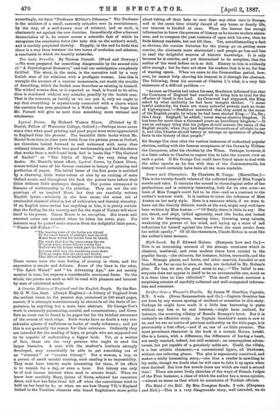Lyrical Poems. By Richard Watson Dixon. (Printed by H. Daniel,
Fellow of Worcester College, Oxford.)—Perhaps there never was a time when good printing and good paper were more appreciated in England than the present. The beautiful little books which Mr. Daniel from time to time puts forth from his private press at Oxford, are therefore looked forward to and welcomed with more than ordinary interest. All who love good workmanship and feel the charm that works from a well-found book, find in books like "The Garland of Rachel" or "The Idylia of Dyer," the very thing they desire. Mr. Daniel's latest effort, Lyrical Poems, by Canon Dixon, comes behind none of his former ventures in beauty of printing and perfection of paper. The initial letter of the first poem is enriched hy a charming little watercolour or else by an etching of some Qxford scene, and throughout the book the poems have before their titles delicate little arabesque designs. The poems correspond in fineness of workmanship to the printing. They are not the our ponrings of an inspired Muse, but they are carefully written English lyries,—scholarly in the best sense, the sense not of overloaded classical allusion, but of cultivation and literary sincerity. If an English verse-writer has anything in him, it is pretty certain that the feeling for the country and for the ways of Nature will show itself in his poems. Canon Dixon is no exception. His truest and Sweetest notes are sounded when he takes his oaten pipe. For instanoe may be quoted some stanzas from the delightful little poem, "Winter will Follow " The heaving roses of the hedge are etirred By the sweet breath of summer, and the bird Makes from within his jocund voice be heard.
The winds that kes the roses sweep the sea Of uncut grass, whose billows router free Half-drown the hedges which part lea from lea.
But soon shall look the wondering roses down Upon an empty field out olose and brown, That lifts no more its height against their owe •
These verses have the true feeling of country in them, and the expression is simple and delicate. Some of the lines in the odes, "The Spirit Wooed" and "On Advancing Age," are not merely musical in tone, but express a considerable emotional force. On the whole, the poems are such as will be read with pleasure and interest by men of cultivated minds.


































 Previous page
Previous page